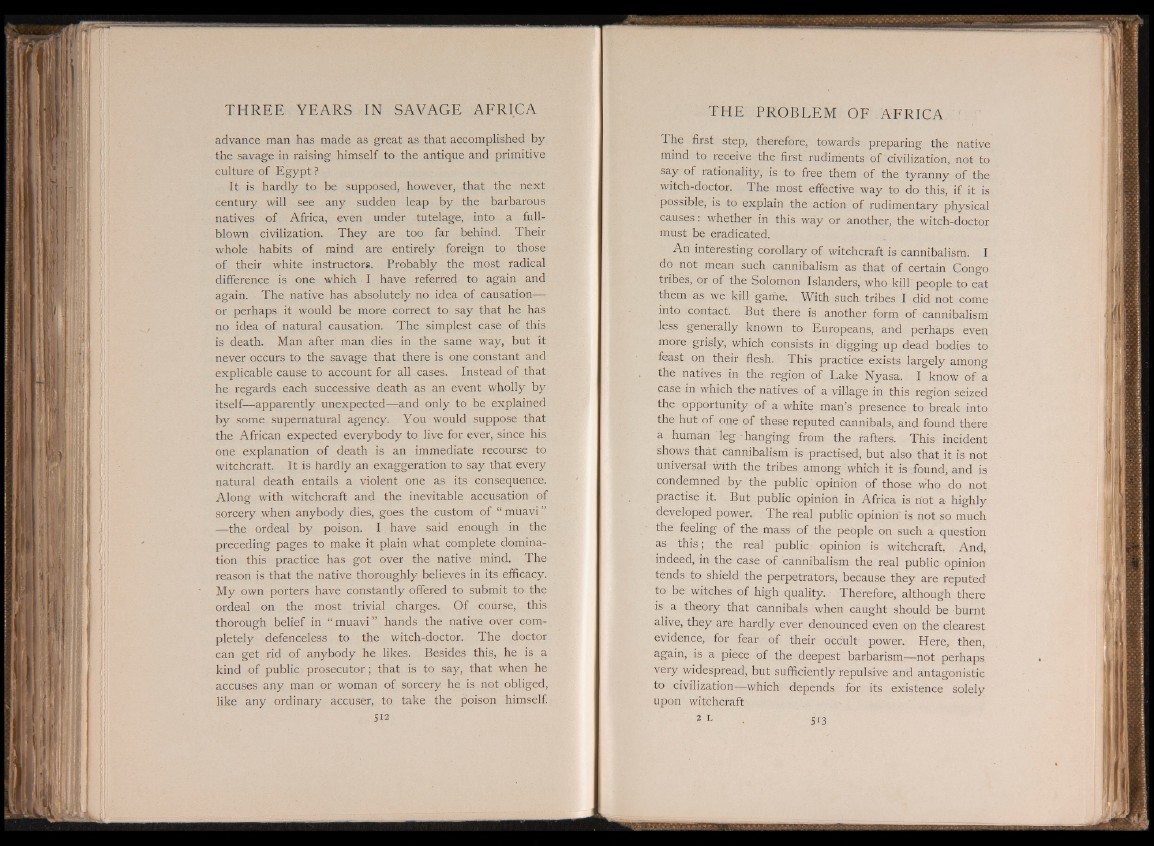
advance man has made as great as that accomplished by
the savage in raising himself to the antique and primitive
culture of Egypt ?
It is hardly to be supposed, however, that the next
century will see any sudden leap by the barbarous
natives of Africa, even under tutelage, into a fullblown
civilization. They are too far behind. Their
whole habits of mind are entirely foreign to those
of their white instructors. Probably the most radical
difference is one which I have referred to again and
again. The native has absolutely no idea of causation—
or perhaps it would be more correct to say that he has
no idea of natural causation. The simplest case of this
is death. Man after man dies in the same way, but it
never occurs to the savage that there is one constant and
explicable cause to account for all cases. Instead of that
he regards each successive death as an event wholly by
itself—apparently unexpected—and only to be explained
by some supernatural agency. You would suppose that
the African expected everybody to live for ever, since his
one explanation of death is an immediate recourse to
witchcraft. It is hardly an exaggeration to say that every
natural death entails a violent one as its consequence.
Along with witchcraft and the inevitable accusation of
sorcery when anybody dies, goes the custom of “ muavi”
—the ordeal by poison. I have said enough in the
preceding pages to make it plain what complete domination
this practice has got over the native mind. The
reason is that the native thoroughly believes in its efficacy.
My own porters have constantly offered to submit to the
ordeal on the most trivial charges. Of course, this
thorough belief in “ muavi” hands the native over completely
defenceless to the witch-doctor. The doctor
can get rid of anybody he likes. Besides this, he is a
kind of public prosecutor; that is to say, that when he
accuses any man or woman of sorcery he is not obliged,
like any ordinary accuser, to take the poison himself.
512
The first step, therefore, towards preparing the native
mind to receive the first rudiments of civilization, not to
say of rationality, is to free them of the tyranny of the
witch-doctor. The most effective way to do this, if it is
possible, is to explain the action of rudimentary physical
causes: whether in this way or another, the witch-doctor
must be eradicated.
An interesting corollary of witchcraft is cannibalism. I
do not mean such cannibalism as that of certain Congo
tribes, or of the Solomon Islanders, who kill people to eat
them as we kill game. With such tribes I did not come
into contact. But there is another form of cannibalism
less generally known to Europeans, and perhaps even
more grisly, which consists in digging up dead bodies to
feast on their flesh. This practice exists largely among
the natives in the. region of Lake Nyasa. I know of a
case in which the natives of a village in this region seized
the opportunity of a white man’s presence to break into
the hut of one of these reputed cannibals, and found there
a human leg hanging from the rafters. This incident
shows that cannibalism is practised, but also that it is not
universal with the tribes among which it is-found, and is
condemned by the public opinion of those who do not
practise it. But public opinion in Africa is not a highly
developed power. The real public opinion is not so much
the feeling of the mass of the people on such a question
as this; the real public opinion is witchcraft, And,
indeed, in the case of cannibalism the real public opinion
tends to shield the perpetrators, because they are reputed
to be witches of high quality. Therefore, although there
is a theory that cannibals when caught should be burnt
alive, they are hardly ever denounced even on the clearest
evidence, for fear of their occult- power. Here, then,
again, is a piece of the deepest barbarism—not perhaps
very widespread, but sufficiently repulsive and antagonistic
to civilization—which depends for its existence solely
upon witchcraft